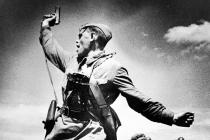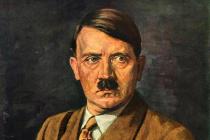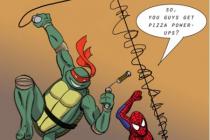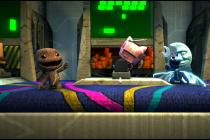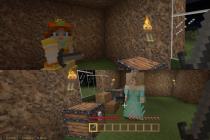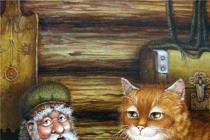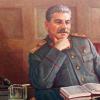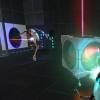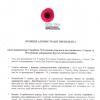Initially, Philip Philipovich was not going to create artificial man, especially the one that turned out to be Sharikov. The operation was carried out to "clarify the issue of the survival of the pituitary gland, and later on its effect on the rejuvenation of the body in humans." As often happens, the experiment led to unexpected consequences that can hardly be called favorable. We can safely say that the experience has failed. And not because in the end Polygraph Sharikov had to undergo an operation to return him to his doggy appearance. The experience was unsuccessful because the life of the professor and his household was ruined, because the artificial man did not find a better use for himself, except to become a flayer, finally, because in place cutest dog turned out to be a real bastard.
The professor himself is not to blame. From the moment Sharik began to transform, events got out of control. Preobrazhensky is a surgeon, he could not predict changes in character ex-dog and thought only later, when Sharikov had already become a thorn that tormented all the inhabitants of the professor's apartment.
Philip Philipovich is generally a vulnerable person. He spent most of his life in a completely different world: in the world of a scalpel and operating table, anatomical atlases and case histories.
The time was also different. When Preobrazhensky used to break away from his medicine, he saw an orderly, normal life around, where everyone knew his place. In this life, there were still carpets on the main staircase, shoes did not disappear from the galoshes, and the newly-formed tenant associations did not build brick partitions for apartments. Here, in an understandable and logical world, the professor was in place himself and could well discern the true value of another. But that was before. Now Philip Philipovich clearly sees that the world has gone mad, that this is the very “time of change” that the ancient Chinese feared so much. And he, already an elderly, accomplished person, can very clearly see the reasons for the chaos and turmoil in society, he correctly argues about how to make life around him better and more comfortable. But Preobrazhensky does not take into account the fact that reason is not capable of breaking through to madness, that any arguments not in favor of the existing order of things will immediately be declared bourgeois prejudices by the current masters of life, and the professor himself, like many others like him, will be enrolled in the ranks of individuals in need of " clarification ".
Perhaps that is why Philip Philipovich in everyday life does not so diligently change the established way of behavior. He makes small talk over food, goes to the opera, he "holds the brand" of the very part of society that has always been his best part - the brand of a prosperous middle class. Fortunately, there is still an opportunity for this. And most importantly, Professor Preobrazhensky continues to engage in scientific activities and surgical practice.
And the practicing surgeon Preobrazhensky is engaged in the rejuvenation of the human body. Of course, not complete - it has not come to that yet. But he is capable of adding a little youth to the fading rich. They pay well for it. And again, it is not Philip Philipovich's fault that his services are used by caricatured and, in general, miserable persons. All these green-haired ladies' men and young old women for him are just patients, working material. The professor treats them condescendingly and does not particularly seek to poke around in their souls. He has enough bodies. And for the time being, everything goes well - there is not the slightest reason to change your views. For the first time, a reason appears when the already operated Sharik begins to behave in such a way that prohibitive announcements have to be glued all over the house, but this measure also helps badly.
The main mistake of Professor Preobrazhensky lies precisely in the fact that he later became interested in who the owner of the pituitary gland was during his lifetime. After all, as it turned out, it is the pituitary gland that determines the human personality. As a result, the quite cute and touching dog Sharik got into his brain Klim Chugunkin - a previously convicted, thieving balalaika who abused alcohol and, in the end, died of a stab in the heart in a drunken fight.
Nothing good could come from such a neighborhood. The ball turned out to be driven into a corner of consciousness, and Chugunkin not only began to rule the ball, but also managed to distort a lot of the inherent in a dog, to make a real vice out of a minor flaw or even out of dignity (for example, pity for the typist Vasnetsova).
However, Polygraph Poligrafovich turned out to be who he was, not only because of the Chugunkin pituitary gland. Sharik himself, too, at some moments of his wandering life, for certain, stole, and knew how to bite on the sly, and set his tail between his legs in front of the one who was stronger. But for a homeless dog, all these disadvantages are a way to survive. When he settled with the professor, when he was fed and cured, Sharik changed. Has changed so much that it would hardly have been able to settle down again on the street: “I am a master's dog, an intelligent creature, I have tasted better life". In the "better life" Sharik no longer had to steal food, run from the janitors, freeze through the doorways. For a dog, more happiness is not necessary.
But, alas, Polygraph Poligrafovich is a man. And in comparison with Preobrazhensky, with Bormenthal, even with Zinochka and Daria Petrovna, he is a second-class creature. In fact, he's a vagabond again. The janitors and doormen for him were those who took him from the frosty Moscow streets, who lured him, walked him and stroked him. In this situation, the Dog Ball could no longer cope. Chugunkin undertook his survival in human society. And the new benefactor who tamed the wandering creature, Polygraph Poligrafovich, was the manager of Shvonder.
The result is logical. With a well-mannered and prosperous professor, Sharik felt like an incognito canine prince. And under the auspices of the proletarian Shvonder, Sharikov became the true children of the troubled era, became as significant as a normal pet. By and large, he remained a dog even in human form. Even chasing cats, he still caught fleas with his teeth.
Could it be otherwise?
Probably it could, if Sharik had been operated on not in the twenty-fourth, but in the fourteenth year, if the pituitary gland belonged to a lighter personality than Klim Chugunkin, if Preobrazhensky paid a little more attention to him, and the ill-fated Shvonder was not nearby. After all, Philip Filippovich hardly perceived his creation as a thinking and independent creature. To reprimand him, to poke his nose into the wrong, to take him by the throat is always welcome. On this and the professor is ready, and Bormental. But Shvonder, unfortunately for Preobrazhensky, sees in Sharikov an oppressed and powerless element. And he begins to take a lively part in his fate. It is Shvonder who gives Sharikov a name, achieves a document, palms off books and even subsequently arranges for a position. Isn't it Philip Philipovich with his Krakow sausage? After all, it is no worse. Well, and the fact that the name is inhuman, the booklet is revolutionary, and the position is a knacker, so let's not forget who Shvonder is. It would be strange if the house manager sent his ward to the institute, presented the works of humanist philosophers and began to teach him how to use a knife and fork.
By the way, Preobrazhensky could have taken care of the proper upbringing of Polygraph Poligrafovich. Yes, Klim Chugunkin was very strong in the newly created person, but there is always a way, a method of selecting a "key" to a heart that remained a dog's. And, as we remember, Sharik is a very cute creature capable of love and gratitude.
It is quite possible that Philip Philipovich did not fully believe that a real person came out from under his scalpel. He is a scientist, he has the right to doubt. And Sharikov now and then throws out tricks that are more inherent in a dog than a man. Chasing a cat in a professor's apartment, for example. And the behavior of Polygraph Poligrafovich when he was torn to pieces with claws, when Preobrazhensky and Bormental gave him a reproach for the pogrom committed in the apartment. Isn't it, everything very much resembled the actions of a dog, which got up on its hind legs and learned to speak, and not a man.
Shvonder is not a scientist, he just believes only in his own eyes. And for the rest, he lacks imagination. He is a proletarian to the marrow of his bones, thanks to which Polygraph Poligrafovich is perceived by him not with his mind, but with emotions. How can you not reach out to the oppressed?
And so it happened that the unfortunate dog was tamed a second time. And, as befits a master's dog, he began to grind on other people's teeth.
Thus, under one roof in Philip Philipovich's apartment were baseness and idealism.
The idealist Preobrazhensky clings with all his might to the inviolability of his usual life. He is sure that this is possible even at a time when Soviet Russia is slowly sprouting on the ruins of Tsarist Russia. Meanwhile, the newly-minted proletarian barks at his former idol with might and main. Does the professor forbid Sharikov to play the balalaika until he is stupid, swear with obscene words and wear vulgar lacquer boots? This means that we can safely talk about the infringement of rights, about the fact that Philip Philipovich oppresses the unfortunate dog-man. This means that you can threaten with retaliation and it is even necessary so that the bourgeois does not accidentally think too much of himself.
Preobrazhensky, with the light hand of Polygraph Poligrafovich, is suddenly forced, having experienced some of the "delights" of a new life, to realize: he cannot be outside of it. Even a professor in Soviet times learns what a flood in an apartment is because of broken plumbing, what it is like when Sharikov's drunken friends steal a hat and a cane, and Sharikov himself proudly declares that he is registered here on sixteen square arshins and will not get anywhere.
The professor and Bormental defend themselves against the invasion of modern times by all available means. And they seem to be winning. Polygraph Poligrafovich becomes Sharik again, most likely, everything will return to normal in the apartment. How long? Apparently not.
"Heart of a Dog" is not only a description of the surgical experience of Professor Preobrazhensky and its consequences. This is not only a story of the collapse of hopes that an animal can be made into a human. The story is itself an experiment conducted by the author, M. A. Bulgakov. The surgeon works with human flesh. The writer experiments with the souls of his characters, with their lives and destinies.
Through an allegory, a fantastic assumption, the writer considers the possibility of peaceful coexistence of the old, patriarchal philistine society of pre-revolutionary Russia and the emerging Soviet system, a new order. The story was written in 1925, when it was still possible not only to fear a gloomy, unpredictable future, but also to feel hope for a successful outcome of the troubled time.
And it is immediately discovered that the old and the new societies speak completely different languages. The professor shuns expressions like: "labor element", does not recommend reading Soviet newspapers before meals and refuses to eat what is proudly called Krakow sausage in the grocery store and what Sharik defines by his unmistakable scent as "chopped mare with garlic."
In turn, the new society is hostile to large apartments, university education and theater. In the first case, there is an ordinary envy: when another has ten rooms, and you have some kind of closet under the stairs, you really want to change. The proletariat is afraid of education, since a well-rounded person, as a rule, sees the mistakes of the communist doctrine. The proletariat simply does not understand theater: "They talk, talk ... There is only one counter-revolution."
The second barrier to the coexistence of the new and old foundations is their mutual confidence in their own righteousness and in the delusion of their opponents. Preobrazhensky declares that "you cannot serve two gods." From the height of his own experience and from the position of a person accustomed to a normal life rhythm, he says: "It is impossible at the same time to sweep tram tracks and arrange the fate of some Spanish ragamuffins!" Is he right? Yes, right.
But the proletariat is convinced of the exact opposite. Every person who has succumbed to the red ideology firmly believes that without his personal participation no business will get off the ground. And even if he is just a turner, or even a janitor, or even a goldsmith. But the Soviet power is his power too. It used to be run by imperialist predators! Is the proletarian right? Yes, right.
The mutual correctness of both is explained by the fact that they are deliberately in different positions. Everything is relative, and it is impossible to assess the truth of different ideas from one point.
And when people with different convictions come across, and even speaking in different languages, and even 100% confident in their rightness, the conflict cannot be avoided. And this conflict will not become a joking childish brawl, but a real war of destruction. Which, by the way, is what happens in Heart of a Dog. To finally get rid of Sharikov, you have to return him to an animal state. In fact, to commit a crime, although Preobrazhensky did his best to avoid this, thereby demonstrating another vulnerable side of people of the old school: the desire to keep their hands clean. A crime is immoral, it is humiliating for a person, but for a doctor it is almost impossible. The doctor is used to saving lives, not ruining them.
Meanwhile, the proletarians, the current masters of life, will stop at nothing. Anonymous letters, newspaper notes, slander are only a small part of what they are ready for. If necessary, then murder will hardly become an obstacle ...
Thus, the failure of the experiment described in "Heart of a Dog" is natural. A writer cannot lie to the reader and to himself. The old society is doomed to perish if it does not adopt its methods in the battle with the new one. Preobrazhensky defeated Sharikov because he was able to understand this and commit an atrocity in the name of himself and others. Perhaps, describing the pitiful finale of Polygraph Poligrafovich, Mikhail A. Bulgakov gave hope that everything would be fine, that the terrible dream in which Russia found itself after the seventeenth year would pass and be forgotten. Does he believe it? Hard to say.
The reason for the failure of the experience, therefore, is the time at which the action takes place and the people who are around the artificial person. And Philip Philipovich Preobrazhensky is just a victim of circumstances. As, however, the great disappointment of his surgical and scientific career in general - Polygraph Poligrafovich Sharikov.
Essay on the topic: REASONS OF THE EXPERIMENT FAILED BY PROFESSOR PREOBRAZHENSKY
Searched on this page:
- What is the mistake of Professor Preobrazhensky
- why the experiment of professor Preobrazhensky failed
- Professor Preobrazhensky's mistake
- characteristics of Professor Preobrazhensky
- Why the Preobrazhensky experiment failed
What mistake did Professor Preobrazhensky make in the story "Heart of a Dog" ?? and got the best answer
Answer from Nina Duke [guru]
Bulgakov masterfully shows psychological type a Russian scientist who has not yet encountered all the "delights" of the Bolshevik regime. Carried away by his developments, the professor did not notice that he had gone too far and created a representative of the harsh government. And this is the deep meaning of the story. The Russian intelligentsia, in search of universal happiness, embarked on an experiment, the monstrous result of which they did not expect. The newly-minted Sharikov literally brings the scientist to life. The professor, in late repentance, laments his mistake: “I was concerned about something completely different, about eugenics, about improving human breed... And now he ran into rejuvenation. "Realizing his fatal mistake, Professor Preobrazhensky performs a new operation to free mankind from this nightmare. He returns Sharikov to his previous state. In our time, the question of the responsibility of each person for the results of his work is very acute. experiments on nature led to a catastrophe in ecology. Scientific discoveries in the XX century made it possible to create a superweapon that does not make sense to use, because then the whole planet will perish. We constantly feel the results of social experiments on ourselves. The biosocial experiment is described in Mikhail Bulgakov's story "Heart of a Dog" The purely scientific curiosity of Professor Preobrazhensky leads to the birth of an unusual creature - the monster Sharikov! In the new society, slaves come to power who have not changed their slave nature in anything. addicted people ... The Sharikovs received power earlier than the foundations of culture and education.
Answer from Milianna Kurashinova[newbie]
He created Sharikov, a monster dangerous for society .... for all mankind. That's how O
Answer from Dasha emelina[guru]
made a bad man out of a good dog,
Answer from Lyudmila Privalova[guru]
He himself admits: "Tell me, colleague, why artificially fabricate Spinoz, at a time when any woman can give birth to him anytime? After all, Madame Lomonosov gave birth to this famous one in Kholmogory!"
Answer from Diana Ermakova[guru]
Violent interference in the nature of man and society leads to disastrous results. But in life, such experiments are irreversible. And Bulgakov managed to warn about this at the very beginning of those destructive transformations that began in our country in 1917.
Answer from Seal[guru]
created Sharikov
Answer from Olesya Milovanova[guru]
turned a dog into a man.
Answer from Ly[guru]
He imagines himself to be a god ...
Answer from 3 answers[guru]
Hey! Here is a selection of topics with answers to your question: What mistake did Professor Preobrazhensky make in the story "Heart of a Dog" ??
Bulgakov's story "Heart of a Dog" is a bitter satire of the writer on surrounding reality 1920s Post-revolutionary Moscow with its orders and inhabitants does not "inspire" Bulgakov, he does not at all share enthusiastic hopes for a bright future, towards which the whole country is now striving.
Professor Philip Philipovich Preobrazhensky, a genius scientist and doctor, does not share these hopes either. This middle-aged man, who has devoted his whole life to science, takes upon himself and plays (to a certain extent) the role of God - he turns the rootless dog Sharik into a citizen of Sharikov.
It is how God perceives Preobrazhensky Sharik, dying of hunger, whom the professor picked up on the street. It is not for nothing that in the portrait of a scientist, given through the perception of a dog, the words "priest", "magician", "sorcerer" play the main role. However, we see that these characteristics are always presented in a reduced, ironic context - Bulgakov very much doubts the possibilities of Preobrazhensky (whose name and location of the house - on Prechistenka - refer us to the biblical legend of the creation of man) to be God: “- Hee hee! You are a magician and a sorcerer, professor, ”he said in confusion. - Take off your pants, my dear, - ordered Philip Filippovich and got up.
The scene of Sharik's “transformation” is described in the same “parody-gospel” key. Bulgakov emphasizes in every possible way that this is not a sacred rite, but a "cynical operation", the purpose of which is to rejuvenate a person by transplanting the gonads: “Philip Filippovich climbed into the depths and in several turns tore out his seminal glands from Sharik's body with some scraps. Bormental, completely wet with zeal and excitement, rushed to the glass jar and pulled out from it other, wet, sagging seminal glands. "
The image of the professor is thus ambiguous. Philip Philipovich is a complex and contradictory nature. On top of that, Preobrazhensky is forced to live in a critical era - he, a child of noble Russia, exists in Soviet Russia, not understanding and not accepting its order.
By his convictions, Philip Philipovich is a humanist who believes that any creature, person or animal, can only be influenced by affection. Violence, and even more so, terror will not lead to any results, only, perhaps, to counter terror: "Terror cannot be done with an animal, no matter what stage of development it is."
According to Philip Philipovich, the existence of a person, both personal and public, should be based on an inviolable postulate - respect for the individual, for her inner dignity. It is this "sacred law" that is being mercilessly trampled upon in Soviet Russia, and Preobrazhensky categorically does not accept this. In his opinion, the priority of the interests of the state over the interests of the individual leads to the destruction of the same state and the people living in it. And the professor sees disrespect for a person everywhere and, above all, in his own home.
In addition, Preobrazhensky is deeply convinced that everyone should mind their own business. Otherwise, a catastrophe is inevitable: “... when he hatches all sorts of hallucinations and starts cleaning the sheds - his direct business - the devastation will disappear by itself. You cannot serve two gods! "
However, this "genius in theory" is also prone to make mistakes "in practice." Bulgakov shows that the claims of an undoubtedly talented professor to the role of a creator are ridiculous. The operation performed by the professor on Sharik gave amazing results - no one expected that the dog would turn into a human and that this person would not succumb to any influence.
Every day Philip Philipovich watched with horror what his "brainchild" was turning into - a mixture of the dog Sharik and the drunkard Klim Chugunkin. And more and more Preobrazhensky became convinced that the genes of the proletariat are destructive and that his "homunculus" is socially dangerous, threatens, first of all, the professor himself: "... the old donkey Preobrazhensky ran into this operation as a third year student."
Bulgakov emphasizes that this intelligent and educated person had to understand and objectively assess his capabilities. Unable to do this, Preobrazhensky endangered himself and his loved ones.
With the help of this thought, the writer again refers us to the events that recently took place outside the window of the prechistensky apartment of the professor - to the revolution of 1917, the "ideological center" of which were also intellectuals, who decided to make balls out of balls. And they did not foresee the destructive consequences of their "experiments".
Professor Preobrazhensky is able to admit that he was mistaken, that he took on an unbearable role: "Here, doctor, what happens when a researcher, instead of walking in parallel and groping with nature, forces the question and lifts the veil." And that, in essence, his "brilliant discovery" "is exactly one broken penny." Furthermore, the hero decides to destroy "the result of his experiment" - to turn Sharikov into a dog again. Are the ideological inspirers of the revolution capable of doing this?
Of course, there is a deep connotation behind the plot of the story. "Heart of a Dog" is not only and not so much a story about a scientific experiment in a laboratory as a bitter story about a "revolutionary experiment" on a national scale. According to Bulgakov, after the events of 1917, the Sharikovs in the most unnatural way turned into “masters of life”. But the "noble" place did not add to them a "noble" origin - these people lack knowledge, education, elementary human culture in order to fulfill the role assigned to them.
Sharikov stopped again in a harmless Sharik, but is a "reverse" experiment possible on a national scale? The writer leaves this question open.
Mikhail Bulgakov's story "Heart of a Dog" can be called prophetic. In it, the author, long before our society rejected the ideas of the 1917 revolution, showed the dire consequences of human intervention in the natural course of development, be it nature or society. Using the example of the failure of the experiment of Professor Preobrazhensky, M. Bulgakov tried to say in the distant 1920s that the country must be returned, if possible, to its former natural state.
Why do we call the experiment of the brilliant professor unsuccessful? From a scientific point of view, this experience, on the contrary, is very successful. Professor Preobrazhensky performs a unique operation: he transplants a human pituitary gland to a dog from a twenty-eight-year-old man who died a few hours before the operation. This man is Klim Petrovich Chugunkin. Bulgakov gives him a short but capacious description: “The profession is playing the balalaika in taverns. Small in stature, poorly built. The liver is dilated 1 (alcohol). The cause of death is a stab in the heart in a pub. " And what? In the creature that appeared as a result of a scientific experiment, the makings of an eternally hungry street dog Sharik are combined with the qualities of an alcoholic and criminal Klim Chugunkin. And there is nothing surprising in the fact that the first words he uttered was swearing, and the first "decent" word was "bourgeois".
The scientific result was unexpected and unique, but in everyday life, it led to the most disastrous consequences. The type of "small stature and unsympathetic appearance" that appeared in the house of Professor Preobrazhensky as a result of the operation turned the well-oiled life of this house upside down. He behaves defiantly rude, arrogant and arrogant.
The newly-minted Polygraph Poligrafovich Sharikov wears patent leather boots and a poisonous tie, his suit is dirty, untidy, and tasteless. With the help of Shvonder's house committee, he registers in Preobrazhensky's apartment, demands the "sixteen yards" of living space allocated to him, even tries to bring his wife into the house. He believes that he is raising his ideological level: he is reading a book recommended by Schwonder — the correspondence between Engels and Kautsky. And even makes critical remarks about the correspondence ...
From the point of view of Professor Preobrazhensky, all these are pathetic attempts that in no way contribute to the mental and spiritual development of Sharikov. But from the point of view of Shvonder and those like him, Sharikov is quite suitable for the society they create. Sharikov was even hired by a government agency. For him, to become, albeit small, but a boss means to transform outwardly, to gain power over people. Now he is dressed in a leather jacket and boots, drives a state car, controls the fate of a secretary girl. His impudence becomes limitless. All day long in the house of the professor one can hear obscene language and balalaika chirping; Sharikov comes home drunk, sticks to women, breaks and destroys everything around him. It becomes a thunderstorm not only for the inhabitants of the apartment, but also for the inhabitants of the whole house.
Professor Preobrazhensky and Bormental unsuccessfully try to instill in him the rules good taste, develop and educate it. Of the possible cultural events, Sharikov likes only the circus, and he calls the theater counter-revolution. In response to the demands of Preobrazhensky and Bormental to behave culturally at the table, Sharikov notes with irony that this is how people tortured themselves under the tsarist regime.
Thus, we are convinced that the anthropoid hybrid of Sharikov is: this is more a failure than a success of Professor Preobrazhensky. He himself understands this: "Old donkey ... Here, doctor, what happens when a researcher, instead of walking in parallel and groping with nature, forces the question and lifts the veil: here, get Sharikov and eat him with porridge." He comes to the conclusion that violent interference in the nature of man and society leads to disastrous results. In the story "Heart of a Dog" the professor corrects his mistake - Sharikov turns into rtca again. He is content with his fate and with himself. But in life, such experiments are irreversible, Bulgakov warns.
With his story "Heart of a Dog" Mikhail Bulgakov says that the revolution that took place in Russia is not the result of the natural socio-economic and spiritual development of society, but an irresponsible experiment. This is how Bulgakov perceived everything that was happening around him and what was called the construction of socialism. The writer protests against attempts to create a new perfect society using revolutionary methods that do not exclude violence. And he was extremely skeptical about bringing up a new, free person by the same methods. The main idea of the writer is that naked progress, devoid of morality, brings death to people.
Here we should recall the story of Mikhail Bulgakov "Heart of a Dog". The protagonist, physician F. F. Preobrazhensky, does the seemingly impossible. He transforms a dog into a human through pituitary transplant surgery. The scientist wants to surprise the scientific world, to make a discovery. But the consequences of such interference in nature are not always good. The new Sharik in the human form of P.P. Sharikov will never become a full-fledged person, but will resemble the very drunkard and thief whose pituitary gland was transplanted to him. A man without a conscience who is capable of any meanness.
Also in another work of Mikhail Bulgakov - "Fatal eggs", it is shown how an irresponsible attitude to science can turn out.
Our experts can check your essay against the USE criteria
Experts of the site Kritika24.ru
Teachers of leading schools and acting experts of the Ministry of Education of the Russian Federation.
Professor-zoologist Vladimir Persikov was supposed to breed chickens, but by a terrible mistake, instead of them, giant reptiles are obtained that threaten with death. Everyone is seized with horror and panic, and when there seems to be no way out, a frost of 18 degrees below zero suddenly falls. Moreover, in August. The reptiles did not survive the cold and died.
In the novel by Ivan Turgenev "Fathers and Sons" main character- Evgeny Bazarov is also engaged in science in the field of medicine. Wants to do something useful. But he is let down by his own worldview. He rejects everything that constitutes the needs of people (love, art). In this "nihilism" the author sees the reason for the death of Eugene.

